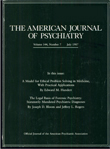Growth hormone response to edrophonium in Alzheimer's disease
Abstract
Neuropathologic data from patients with Alzheimer's disease indicate the presence of neurofibrillary tangles in hypothalamic regions associated with regulation of pituitary hormone release. The authors explored the hypothesis that cholinergic projections to hypothalamic nuclei controlling pituitary growth hormone (GH) release degenerate in Alzheimer's disease. Integrity of cholinergic regulation was tested by assaying the GH response to a presynaptic cholinergic challenge. After administration of the choline esterase inhibitor edrophonium, the peak GH response was 14 ng/ml in healthy elderly control subjects and only 2 ng/ml in Alzheimer's patients. The magnitude of GH blunting was correlated with cognitive and functional deficits. Possible implications of these data for enhanced accuracy in the diagnosis of dementia are discussed.
Access content
To read the fulltext, please use one of the options below to sign in or purchase access.- Personal login
- Institutional Login
- Sign in via OpenAthens
- Register for access
-
Please login/register if you wish to pair your device and check access availability.
Not a subscriber?
PsychiatryOnline subscription options offer access to the DSM-5 library, books, journals, CME, and patient resources. This all-in-one virtual library provides psychiatrists and mental health professionals with key resources for diagnosis, treatment, research, and professional development.
Need more help? PsychiatryOnline Customer Service may be reached by emailing [email protected] or by calling 800-368-5777 (in the U.S.) or 703-907-7322 (outside the U.S.).



